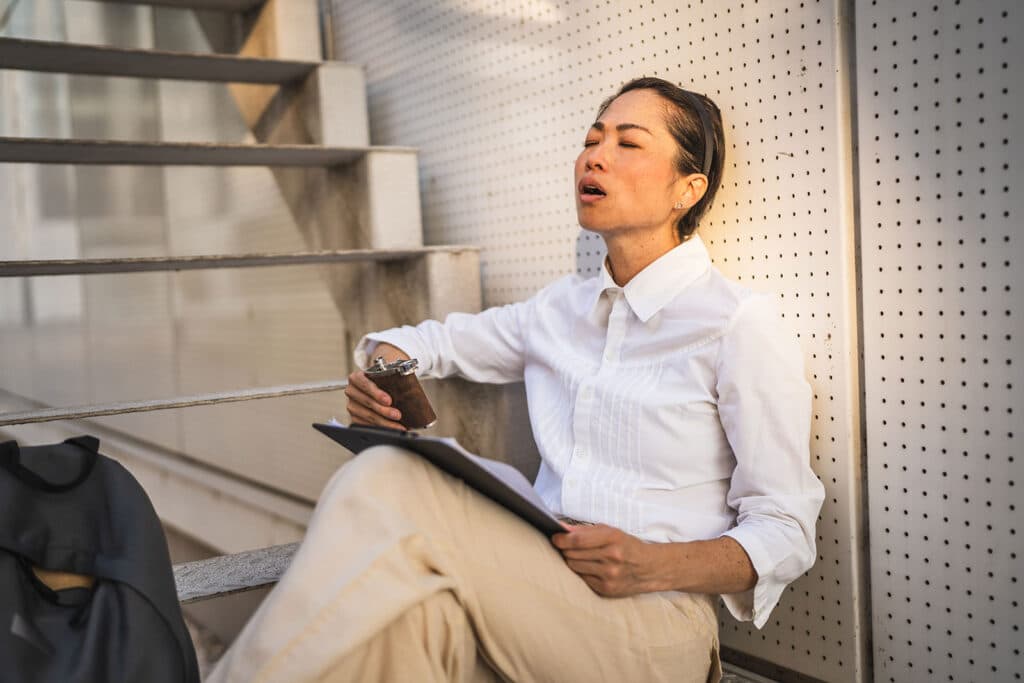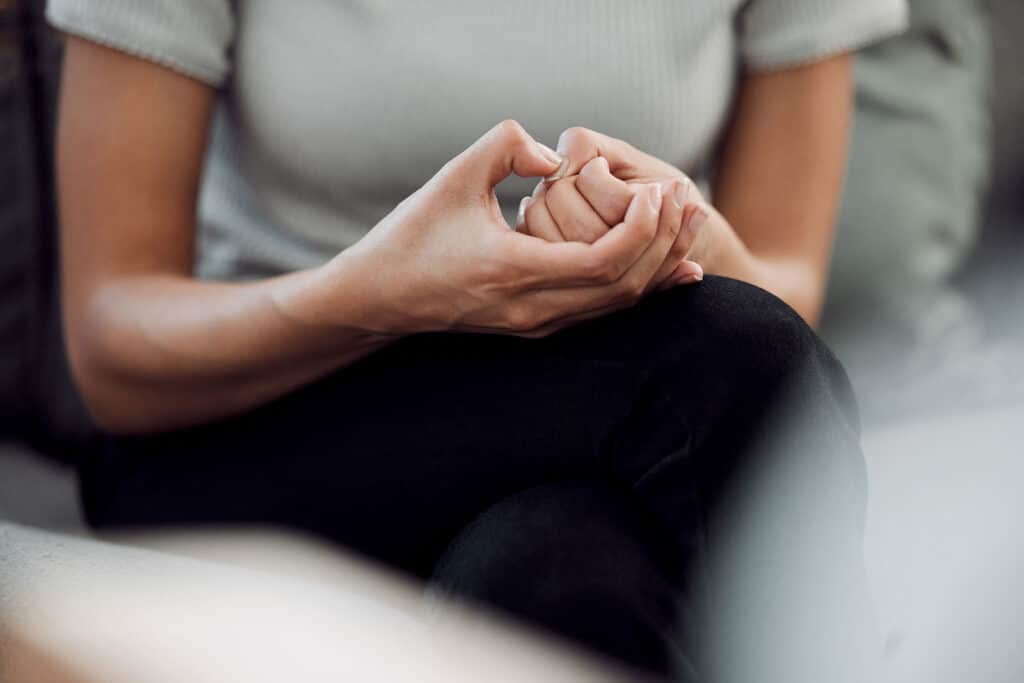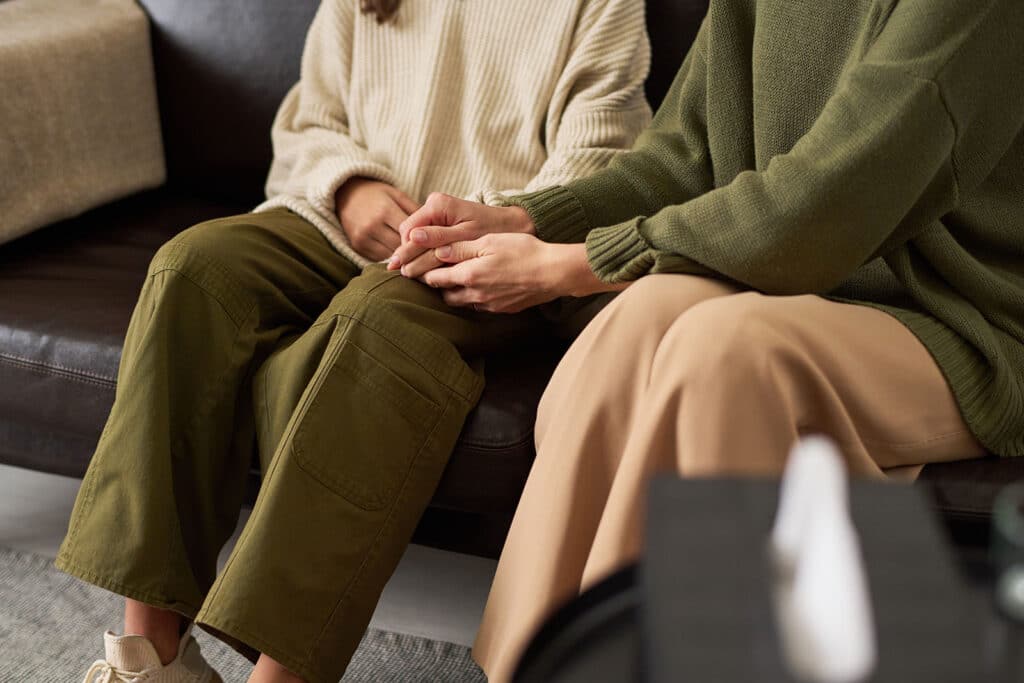For many people, anxiety and addiction often go hand in hand. Those who struggle with anxiety disorders—including conditions like social phobia—may turn to substances like drugs or alcohol as a way to cope with their overwhelming feelings. While they may experience temporary relief, this often leads to substance dependence, impacting their daily life and relationships with family members.
At this stage, individuals find themselves in a vicious cycle where their mental health deteriorates, and their addiction deepens. The comorbidity of anxiety and addiction makes treatment challenging but not impossible. Addressing both issues simultaneously is essential, as untreated anxiety can exacerbate addiction, while addiction worsens anxiety symptoms.
At Recreate Life Counseling, we recognize the importance of treating both anxiety and addiction in an integrated way. Our providers offer specialized substance abuse treatment and mental health care to help clients regain control of their lives. If you or a loved one are struggling with anxiety and addiction, reach out to learn more about how our healthcare team can guide you toward better mental health and recovery.
Table of Contents
- 1 Types of Anxiety Disorders Linked to Addiction
- 2 The Vicious Cycle of Anxiety and Addiction
- 3 Co-Occurring Disorders (Dual Diagnosis)
- 4 Recognizing the Signs of Anxiety and Addiction
- 5 Treatment Options at Recreate Life Counseling
- 6 The Importance of Ongoing Support
- 7 How to Reach Out for Help
- 8 Recreate Life Counseling Can Assist with Your Recovery
Types of Anxiety Disorders Linked to Addiction

Anxiety disorders are some of the most common mental health issues. According to the Anxiety and Depression Association of America, it is estimated that anxiety affects 40 million individuals in the United States.
When people feel overwhelmed by persistent feelings of fear, worry, or panic, they may turn to drugs or alcohol to escape or manage their symptoms. Unfortunately, this behavior often leads to addiction, creating a cycle in which the anxiety disorder and substance abuse reinforce one another. Here are some of the anxiety disorders most commonly associated with addiction:
Generalized Anxiety Disorder (GAD)
Unlike normal levels of stress or anxiety, individuals with GAD are often in a constant state of worry or fear. This persistent state of tension leads to physical symptoms, such as restlessness, muscle tension, irritability, and fatigue. Along with physical symptoms, individuals may experience an emotional toll of feeling constantly on edge, which can push them to self-medicate.
Sometimes, alcohol or prescription medications may be used to suppress the relentless worry or relax their tense bodies. While these substances may offer short-term relief, they do nothing to address the root cause of the anxiety and often lead to dependence or addiction.
Social Anxiety Disorder
Individuals with social anxiety disorder often experience an intense fear of being judged, humiliated, or rejected in social settings. Activities like talking to strangers, attending parties, or even eating in public can trigger this overwhelming fear. Many individuals may avoid social situations altogether or use substances like alcohol or drugs to ease their anxiety.
These substances can quickly become a crutch, with individuals feeling they can only engage in social interactions while under the influence. Over time, their social anxiety may worsen as their reliance on substances increases, trapping them in a cycle of avoidance and addiction.
Panic Disorder
Those with panic disorder experience sudden and intense episodes of fear, often accompanied by physical symptoms like chest pain, heart palpitations, shortness of breath, dizziness, or a sense of impending doom. These symptoms can mimic life-threatening conditions such as a heart attack, increasing the person’s overall anxiety.
In an attempt to prevent or manage these terrifying episodes, individuals with panic disorder may turn to benzodiazepines or alcohol. While these substances may temporarily dull the intensity of panic attacks, they often lead to misuse and dependence, which can increase the frequency and severity of panic attacks.
Post-Traumatic Stress Disorder (PTSD)
People suffering from post-traumatic stress disorder (PTSD) often relive a traumatic event through flashbacks or nightmares, which can lead to intense feelings of anxiety, fear, or sadness. Self-medication with drugs or alcohol is common as individuals try to numb the distressing symptoms of PTSD. However, substance use often exacerbates these symptoms and increases the risk of addiction, making professional support essential for effective treatment.
Obsessive-Compulsive Disorder (OCD)
Obsessive-compulsive disorder (OCD) is another anxiety-related condition that can be linked to addiction. Individuals with OCD experience intrusive, persistent thoughts and feel compelled to perform certain behaviors or rituals to alleviate their anxiety. Some may turn to alcohol or drugs in an attempt to quiet these obsessive thoughts or reduce the compulsive behaviors. Unfortunately, this can lead to addiction without resolving the underlying anxiety.
Agoraphobia and Specific Phobias
Agoraphobia involves a fear of situations where escape might be difficult, leading individuals to avoid places like crowded spaces, public transportation, or being alone outside. Those with specific phobias may also turn to substances to manage intense, irrational fears tied to particular triggers. Substance use often worsens these conditions, leading to dependency while avoiding the actual anxiety-provoking situations.

The Vicious Cycle of Anxiety and Addiction
When people use drugs or alcohol to manage their anxiety, they often find themselves trapped in a cycle that worsens both their mental illness and their addiction. Initially, these substances may provide a sense of relief, as alcohol may calm nerves or opioids might dull feelings of fear. However, as the body becomes dependent on these substances, the individual requires more to achieve the same effect, often leading to side effects that impact their mental health.
Over time, using drugs and alcohol as coping mechanisms no longer provides relief. Instead, these substances can actually worsen anxiety symptoms and interfere with the body’s serotonin levels, which play a key role in managing mood and anxiety. Unfortunately, individuals with anxiety may find themselves in a vicious cycle, where their anxiety worsens due to the effects of addiction. At this stage, they may feel unsure whether to prioritize the treatment of anxiety or address their substance use disorder.
Co-Occurring Disorders (Dual Diagnosis)
Many people struggling with anxiety and addiction are diagnosed with co-occurring disorders, also known as dual diagnosis. This means they have both a mental health disorder and a substance use disorder. These cases can be challenging to treat, as both issues must be addressed to increase the likelihood of lasting recovery.
Anxiety and addiction often share overlapping symptoms. For instance, someone with anxiety may experience irritability, insomnia, and restlessness, which are also common during withdrawal from drug use or alcohol abuse. When both disorders are present, it becomes difficult to determine whether the symptoms are related to the mental health condition or the effects of drug abuse. Treating both conditions simultaneously allows us to address the full scope of the individual’s symptoms, rather than focusing on just one aspect of their struggle.
At Recreate Life Counseling, our programs are specifically designed to address both anxiety and addiction. We take into account each client’s risk factors, such as family history and any related health conditions, to create a personalized plan. By treating both disorders, we help clients not only overcome their addiction but also develop healthier coping mechanisms for managing anxiety, ultimately setting them on a path toward sustainable recovery.

Recognizing the Signs of Anxiety and Addiction
One of the first steps to getting help is recognizing the signs and symptoms of anxiety and addiction. These can include:
- Physical symptoms: Restlessness, fatigue, difficulty concentrating, rapid heart rate, and muscle tension.
- Mental issues: Constant worry, feelings of impending doom, fear of social interactions, or irritability.
- Mood changes: Increasing use of alcohol or drugs, neglect of responsibilities, secrecy or lying about substance use, and changes in mood or behavior when not using the substance.
When you recognize these signs, it can help you or a loved one receive more timely intervention. In turn, that can increase the chances of making a full recovery.
Treatment Options at Recreate Life Counseling
At Recreate Life Counseling, we offer a variety of treatment options for those individuals who are struggling with both anxiety and addiction. We focus on helping our clients recover both mentally and physically. Some of these services include:
Therapy
We offer individual, group, and family therapy to help clients explore the root causes of their anxiety and addiction. Cognitive-behavioral therapy (CBT) helps clients identify negative thought patterns and develop healthier coping strategies.
Medical Detox
When someone is struggling with a dependence on drugs or alcohol, then a medical detox may be necessary to safely manage withdrawal symptoms. Our program provides round-the-clock care. We want to make sure that clients go through the detoxification process in a controlled, supportive environment.
Medication-Assisted Treatment (MAT)
For some clients, medication may be necessary. Our MAT program uses FDA-approved medications to help reduce cravings and manage withdrawal symptoms. This holistic approach is combined with therapy and counseling.

The Importance of Ongoing Support
At Recreate Life Counseling, we know that recovery doesn’t end once a treatment program is completed. Ongoing support is needed to prevent relapse and manage anxiety in the long term. For that reason, we provide aftercare services that help clients maintain their sobriety and continue working on their mental health after they’ve left our facility. Our aftercare programs include:
- Continued therapy
- Support groups
- Regular check-ins with counselors
Anyone who is struggling with both anxiety and addiction needs to have access to a support system that understands their struggles. In most cases, family involvement can play a major role in recovery. We offer family therapy and education to help them better understand the challenges of co-occurring disorders and provide the necessary support to their loved ones in recovery.
How to Reach Out for Help
If you or someone you care about is struggling with anxiety and addiction, reaching out for help is the first step toward recovery. At Recreate Life Counseling, we offer compassionate, evidence-based treatment programs designed to meet the needs of individuals dealing with these co-occurring disorders.
If you or a loved one are suffering from anxiety and addiction, make sure to call our team to speak with a specialist about your needs or concerns. We’ll work with you to develop an individualized treatment plan that addresses anxiety and addiction simultaneously.
Recovery is possible. It begins by acknowledging that help is available. We are here to support you every step of the way. However, you need to take those initial steps to get help during these difficult times.
Recreate Life Counseling Can Assist with Your Recovery
Anxiety and addiction are intertwined challenges. However, with the right addiction treatment, recovery is within reach. At Recreate Life Counseling, we are here to help individuals break free from the cycle of anxiety and addiction. Our treatment facility offers both inpatient and outpatient options, providing a combination of therapy, medical support, and ongoing care to ensure effective treatment and lasting recovery. We focus on the whole individual, making sure they have the tools to remain anxiety- and addiction-free for the next stage of their life.
Now is the time to start down the path to recovery. Reach out today and take the first step toward reclaiming your life with a comprehensive recovery program designed to support you every step of the way.



